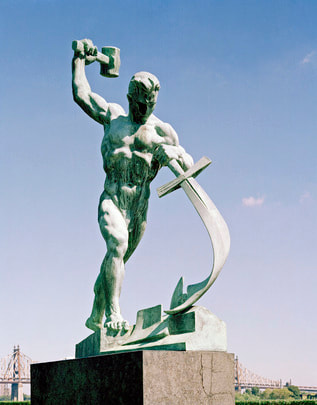Psalm 79
Micah 4:1-5
Revelation 15:1-8
Reflect:
“They shall beat their swords into plowshares”There is a sculpture depicting a man holding a hammer aloft in one hand which he is using to beat a sword into a plough, an image of war being turned into a tool for the thriving of human society. This sculpture resides in the North Garden at the United Nations headquarters in New York overlooking the East River. It is a reduced version of Evgeny Vuchetich’s most famous work which was given by Nikita Khrushchev, former premier of the Soviet Union, to the United Nations in 1959 as a gesture of peace. This was considered a brave gesture during an era of considerable mistrust between the Soviet Union and the United States.
“He will judge between the nations and will settle disputes for many peoples. They will beat their swords into plowshares and their spears into pruning hooks. Nation will not take up sword against nation, nor will they train for war anymore” These verses are in both Isaiah 2:4 and Micah 4:3. This image of laying down weapons against our fellow men and women has evoked powerful hope throughout the millennia.
But to truly understand the power of this image, we must consider what is actually happening to the metal. What any craftsperson that works with metal knows, it needs to be heated in order to increase its ability to be shaped. Molecules vibrate faster and absorb carbon adding to its strength. Then when it is hammered, impurities are released and the surface layer hardens and is not brittle, softer in the center to absorb the shock of impact.
For civilizations to finally be ready to end conflict and enter times of peace, they normally must have gone through an enormous amount of fear, anxiety, suffering, death of beloved companions, and finally exhaustion to provide them with the clarity to see a different path ahead. Similar to metal, the people have been through the fires of adversity and beaten down. It is believed that Micah prophesied during an extremely difficult time when Assyria was again on the move. The Northern Kingdom had been vanquished, people deported, cities fallen and socio-economic injustice was rampant. Micah advocated for the poor farmers and shepherds who were being taken advantage of by the rich and powerful. Still in the midst of his preaching, he looked forward to the day when God would arbitrate among strong nations and everyone, not just Israel, would no longer be in fear and could rest under their own vines and fig trees.
Many of us today are weary of fear and long for the day Micah spoke of. Not the temporary days of human negotiated peace that eventually end when a new power base seeks retaliation or territorial expansion, but the day when Jesus returns to reign over the whole earth and bring permanent peace.
Joan Copeland


 RSS Feed
RSS Feed